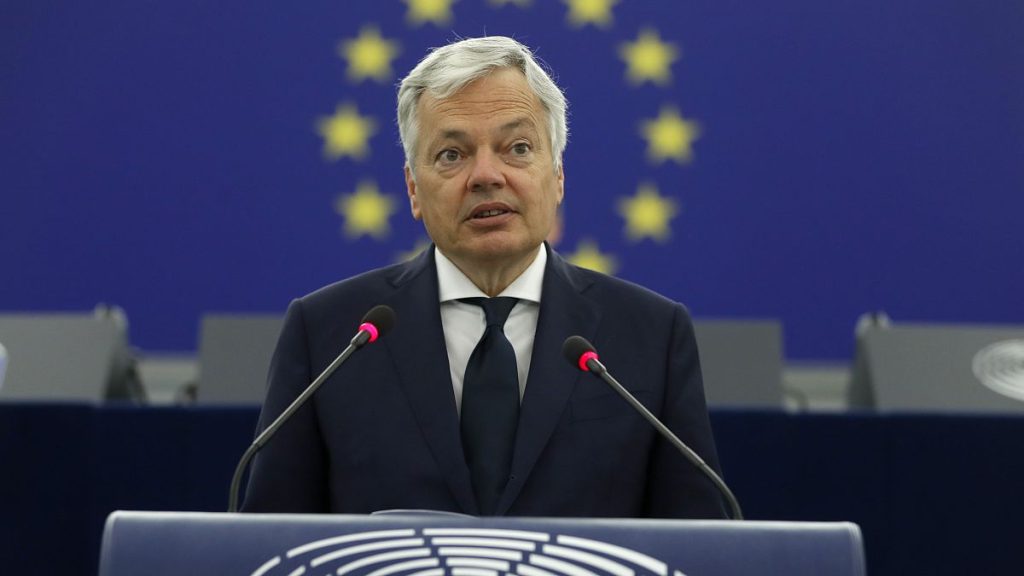Didier Reynders, the former European Commissioner for Justice, finds himself embroiled in a criminal investigation concerning allegations of money laundering, casting a shadow over his distinguished career which included prominent roles as Belgian finance and foreign minister. The investigation, launched by Belgian authorities, stems from concerns surrounding approximately €1 million in suspect funds. The timing of the raids on properties linked to Reynders, occurring immediately after the conclusion of his five-year term at the European Commission, added further intrigue to the unfolding situation. While Reynders, through his legal representative, has categorically denied any criminal wrongdoing, the investigation has nonetheless generated significant public interest and raised questions about the nature of the financial transactions under scrutiny.
The allegations against Reynders revolve around two primary areas of financial activity: suspicious cash payments and substantial lottery ticket purchases. Belgian media reports indicate that investigators are examining around €800,000 in potentially illicit cash payments spanning the last 15 years. In addition, authorities are scrutinizing approximately €200,000 worth of tickets purchased for the Belgian national lottery over the past five years. The discovery of €7,000 in cash during property searches further complicates the narrative and fuels speculation. While Reynders maintains that the investigation pertains solely to the management of his private wealth, the specific nature of these transactions and their potential connection to illicit activities remain central to the ongoing inquiry.
The timing of the investigation, coinciding with the end of Reynders’ tenure as European Commissioner for Justice, has inevitably drawn attention to potential conflicts of interest. Notably, an EU anti-money laundering law enacted during his mandate deemed national lotteries a low-risk activity, thereby requiring fewer regulatory checks. Although a Commission spokesperson has denied any influence by Reynders or his team on this specific provision, the coincidence raises questions about potential vulnerabilities in the system and the possibility of undue influence. The investigation will undoubtedly delve into the details of this legislation and explore any potential connections between Reynders’ personal financial activities and his official responsibilities.
Reynders, through his lawyer, has vehemently denied the criminal accusations, asserting that the characterization of the facts presented in the press is both factually and legally inaccurate. He insists that his political mandates are in no way implicated in the investigation and maintains his commitment to cooperating with the judicial process. The lawyer has refrained from providing further details, citing the need to respect judicial procedures and emphasizing the presumption of innocence. This stance reflects a strategic approach to protecting Reynders’ reputation while simultaneously acknowledging the seriousness of the allegations and the need for a thorough and impartial investigation.
The investigation into Didier Reynders unfolds against a backdrop of heightened scrutiny surrounding financial transparency and accountability, particularly for individuals holding public office. The allegations of money laundering, coupled with the significant sums of money involved and the timing of the raids, create a complex and politically sensitive situation. The investigation’s outcome will undoubtedly have significant ramifications for Reynders’ reputation and future prospects. Moreover, the case highlights the importance of robust anti-money laundering measures and the need for continuous vigilance in ensuring the integrity of financial systems.
As the investigation progresses, the focus will remain on uncovering the truth behind the suspicious financial transactions and determining whether any criminal activity occurred. The Belgian authorities face the challenging task of piecing together the complex financial puzzle and establishing whether the allegations against Reynders are substantiated. The investigation’s findings will not only determine Reynders’ legal fate but also contribute to broader discussions on financial transparency, accountability, and the potential vulnerabilities within regulatory frameworks. The case serves as a reminder of the importance of upholding the highest ethical standards in public life and the need for continuous efforts to combat financial crimes.














